Allah, the Exalted, says: “... and eat and drink until the white thread (light) of dawn appears to you distinct from the black thread (the darkness of the night), then complete your fast till the nightfall.” (Al-Baqarah: 187)
‘White and black thread’, as used in the above verse imply, lightness of the day and darkness of the night respectively.
This implies that he who abstains from all forms of eating, drinking and other things that invalidate fasting, should do that with the sole aim of worshiping Allah Almighty alone. The Prophetﷺ said: “Every action shall be judged according to intention, and behind every action by a man is a specific intention.” [ Agreed upon.]
The intention for fasting should be made the night before dawn, if it is a compulsory
fast. However this (making intention the night before dawn) is not mandatory if the fasting is supererogatory. Thus it is permissible to make an intention for supererogatory fasting during the day, if one has not previously done anything
which nullifies fasting. This is in accordance with the hadith narrated by ‘Aishah, the mother of believers (may Allah be pleased with her): “ The Prophetﷺ entered one day and said: ‘Is there anything to eat?’ We answered that there was not. Upon that, he (the Prophet) said: ‘Hence, I am fasting.’”[ Source: Muslim.]
1- Bathing and sitting in a pool of water to cool oneself off.
2- Swallowing one’s spit and mucus.
3- To taste food on the condition that none of it slips into the throat.
4- To smell the odor of any substance or fragrance of air fresheners.
- The use of a chewing stick :
It is permissible for someone who is fasting to use a chewing stick before and after noon, regardless of whether the chewing stick is wet or dry. However, he should be careful when using a wet chewing stick not to allow pieces of it to slip into his throat, because by that his fast would become invalidated.
The Prophet ﷺ said: “Eat the pre-dawn meal, for indeed, there are blessings in having the pre-dawn meal.” [ Agreed upon.].
Any amount of food, even a sip of water, is sufficient as a pre-dawn meal. This is in accordance with the Hadith of the Noble Prophet ﷺ where he said: “The pre-dawn meal is a blessing, so do not forsake it, even if anyone of you will drink just a sip of water. Indeed, Allah Almighty and His angels pray for those who have the pre-dawn meal.” [ Source: Ahmad.]
It is recommended to delay the pre-dawn meal. It is reported from Zayd ibn Thabit t who said: “We had the pre-dawn meal with the Prophet ﷺ one day and we left (from the sitting) for Salah.” Anas ibn Malik said: “What range of time was between both (your meal and Salah)?” He said: “Up to the span of reading 50 verses (of the Noble Qur’an).” [ Agreed upon.]
If one hears the call to prayer whilst drinking, he is permitted to continue drinking until he finishes. On the authority of Abu Hurayra, the Prophet صلى الله عليه وسلم said: “ If any of you hears the call to prayer while his container (cup of water) is in his hand, he should not drop it until he satisfies his need from it.“ [ Source: Abu Dawud.]
The scholars explained that this Hadith applies to the one who has doubts regarding the appearance of dawn. However, if he is certain of the appearance of dawn, then he should not eat nor drink. If he does so, especially after
making sure of the appearance of dawn, then his fast is invalid, and it is mandatory upon him to pay back such a fast.
It is recommended for one who is fasting to hasten the breaking of his fast whenever he is sure the sun has set. The Prophet ﷺ said: “People will not cease to be in blessings whenever they hasten breaking their fast.” [ Source: Abu Dawud.] Likewise, it is recommended to have one’s iftar (meal taken when breaking one’s fast) first with fresh dates, or dry dates in the absence of fresh dates. It is also recommended to eat an odd number of the dates. Anas ibn Malik t said: “The Prophet used to break his fast on fresh dates before the As-Salah (the prayer), but if not fresh dates, then dry dates, otherwise he would drink (hassa)[ Hasa: he drank.] sips of water.” [ Source: Tirmidhi .] If despite all efforts one finds none of these, and if he intends to break his fast - that will suffice.
It was established that the Prophet ﷺ would say, when breaking his fast: “The thirst has gone and the veins have been moistened and the reward is established, by the Grace of Allah Almighty.” [ Source: Abu Dawud.] The Prophet ﷺ also said: “Indeed for everyone who fasts, at the time of breaking (fast there) is a prayer that will never be rejected.” [ Source: Ibn Majah.]
The Prophet ﷺ said: “On the day when any of you fasts, he should not utter vain talk (Ar-Rafath)[ Ar-Rafath: indecent talk or obscenities. It is also used for sexual intercourse and/or foreplay.] and should not fight nor shout[ As-sakhb: to fight or shout over one another.]. If anyone abuses or fights him, he should say: I am fasting.” [ Agreed upon.]
The Prophet ﷺ also said: “For those who do not abandon false speech and false acts, Allah has no need for them to abandon their food and drink.” [ Source: Abu-Dawud.]
By reciting from Al-Qur’an, remembrance of Allah Almighty, standing up at night for prayer, standing up in the Night of Majesty, observing the daily supererogatory Salah, giving charity, striving relentlessly on the righteous path, providing meals for others who are fasting to break their fast with and by performing lesser Hajj. Righteous deeds in Ramadan are rewarded in manifolds. Ibn ‘Abbas t reported that the Prophet ﷺ was the most generous of men and he was more generous in Ramadan at the time Jibreel met with him, which happened to be every night of Ramadan, and revised the Qur’an with him. Indeed the Prophet ﷺ was more generous when he met with Jibreel, more so than a blowing breeze.” [ Source: Bukhari.]
‘A’ishah (may Allah be pleased with her) said: “When the last ten days (of Ramadan) would come, the Prophet ﷺ would exert himself and tighten his Izaar [‘Tighten his Mi’zar’ is a metaphor that signifies his striving to worship more than usual. It is said that it is one of the most suitable metaphors concerning keeping away from women and leaving sexual intercourse. Mi’zar or Izaar is the waistcloth.] (waistcloth), spend his night in worship, and wake his family [ Wakes his family: To wake them up and prompt them to worship.] (at night).” [ Source: Bukhari.]
This is due to the fear of allowing water to slip into his throat. The Prophet ﷺ said: “... and over draw water (during sniffing in of water in ablution) except when you are fasting.” [ Source: Abu Dawud.]
Kissing is discouraged for one who is fasting if he fears the possibility of ejaculation or imminence of sexual urge. It is also necessary for him to avoid anything that invokes his sexual urge. However, if he is sure of his ability to control his urge from invalidating his fast, then he is permitted to kiss. ‘A’ishah (may Allah be pleased with her) reported: “The Prophet ﷺ used to hug and kiss her while he was fasting. Furthermore he is the best of you, who controls his urge.[ Irbahu: Means his need of it.]” [ Agreed upon.] This is why hugging is disliked between the youth, but not for an old man. On the authority of Abu Hurayrah who said: “A man asked the Prophet ﷺ concerning a man hugging (his wife) when he is fasting and he allowed him, but he disapproved of the same for another man who asked him on another occasion. Then it became clear that the one he permitted was an old man and the one he disapproved of was a youth.” [ Source: Abu Dawud.]
Allah Almighty says: “... and eat and drink until the white thread (light) of dawn appears to you distinct from the black (darkness of night), then complete the fast till the night falls...” (Al-Baqarah: 187)
Important notes:
- Whosoever eats or drinks inadvertently, his fast is authentic and acceptable. However, it is compulsory on him to stop further consumption whenever he remembers. The Prophet ﷺ said: “Whoever eats or drinks forgetfully while fasting should complete his fast, for it is Allah who has fed him and provided for him what he drank.”[ Source: Muslim.]
- Fasting is invalidated by anything which reaches the throat through the mouth or nose; denoting anything which has the meaning of food and drink. An example is an intravenous injection of nutrients. However, if it is a curative injection, such as a penicillin injection, it does not invalidate one’s fast, because it is neither regarded as a form of food, drink, nor their derivatives.
 Penicillin injections do not invalidate fasting.
Penicillin injections do not invalidate fasting.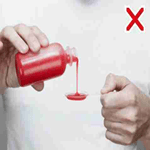 Nutritious medications invalidate fasting.
Nutritious medications invalidate fasting.- There are also some other things, like inhalers or other medical variants for the asthmatics that are needed for special conditions, that do not invalidate one’s fast.
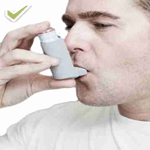 Inhalers for asthmatics do not invalidate fasting.
Inhalers for asthmatics do not invalidate fasting.- The use of eye liner, eye and ear drops or their variants do not invalidate one’s fast, this is because there is no evidence that establishes that fasting is invalidated by any of these. Moreover, eyes are not a usual path for food and drinks. This is also applicable to ear and nose drops; except that it is important to be careful with the nose drops, due to the restrictions by the Prophet ﷺ concerning excesses when the one who fasts sniffs in water (during ablution), as the nose is a clear path to the stomach.
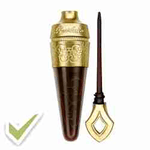 The use of eye liner does not invalidate fasting.
The use of eye liner does not invalidate fasting.- If he who fasts takes or consumes a non-edible item, or harmful things such as cigarettes, his fasting is invalidated. This is because it is consumed through the usual path of food intake (the mouth), and also because it is a variant of eating and drinking.
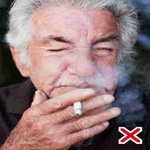 Smoking invalidates fasting
Smoking invalidates fasting- Fasting is not invalidated by things which cannot be prevented. These include the smoke or dust on the road and food leftovers which are attached to the teeth.
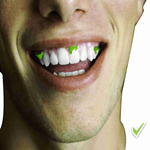 Traces of food in the mouth do not invalidate fasting
Traces of food in the mouth do not invalidate fastingAllah Almighty says: ““it is permissible for you to go into [Ar-Rafathu (have sexual intercourse with)] your wives, in the night of fasting.” (Al-Baqarah: 187).
So anyone who had intercourse while he was fasting, would then have invalidated his fast; and he is thus required to pay back that day (in which his fast was invalidated). In addition, he must expiate by setting a slave free. On his inability to do that, he is required to do either of the following in the order listed: Fast two consecutive months or feed sixty needy people. This is in accordance with the hadith authentically narrated by Abu Hurayrah. He said : “A man came to the Prophet ﷺ and said: ‘I am destroyed.’ The Prophet replied: ‘What is wrong with you.’ The man said:‘I had intercourse with my wife during Ramadan (fasting).’ The Prophet asked: “Are you able to free a slave?’ The man answered: ‘No.’ The Prophet then asked: ‘Are you capable of fasting for two consecutive months?’ The man answered ‘No.’ The Prophet asked further: ‘Are you capable of feeding sixty needy?’ He said: ‘No.’ On that the Prophet ﷺ asked him to sit down, and he sat. After a short while, a large weighing container (Al’Araqu)[ Al-‘Araqu ( a large weighing container) .] full of dates was brought as a gift to the Prophet ﷺ. The Prophet gave it to him and said: ‘Make charity with this.’ The man replied: ‘Do I give charity to whom is poorer than me and my family?’ Upon that the Prophet ﷺ laughed so hard that his molars were seen. Then the Prophet said: ‘Feed your family with it.’” [ Agreed upon.]
This is the sequence of expiation (Kaffarah). It is not correct to feed the sixty needy people if one is able to fast; it is just as wrong to fast if one is capable of manumitting a slave. It is also mandatory on the woman to pay expiation accordingly, if she lures her husband or she responds willingly to his urge. However, if she was forced, the fast is invalidated but she will only pay back that day in which her fasting was invalidated; without any other expiation.
Pertaining to the meaning of sexual intercourse: - Ejaculation of semen willingly; if the fasting person ejaculated willingly when kissing his wife, touching her, by masturbation, or otherwise, his fasting is then invalidated; because that is a desire that contradicts the act of fasting and therefore he has to make up the day without expiation; since expiation is only required when actual sexual intercourse takes place, for the text mentions that in particular.
- If he caresses his wife, touches her, or has thoughts and only discharges madhy (pre-seminal fluid), then his fasting is valid; since there is no text that proves that fasting is invalidated by madhiy.
- If a fasting person sleeps and has a wet dream, or ejaculates without desire, because of sickness, that does not invalidate the fast; because he did not willingly choose to ejaculate.
- If he wakes up in Junub (ritual impurity related to sexual discharge), as a result of having intercourse or a wet dream before Fajr, then his fasting is valid. He only has to perform ghusl (ritual bath following major ritual impurity) to perform sobh salah in Jama’a (congregation in the masjid); since it is authenticated that A’ishah (may Allah be pleased with her) narrated that at times Allah’s Messenger used to get up at Fajr in the state of Janaba (ritual impurity) after having sexual relations with his wives. He would then take a bath and observe Saum (fast).
Definition: The throwing up of whatever is in the stomach of food or drink voluntarily through the mouth. If, however, he is overtaken by his desire to vomit and he throws up involuntarily, then his fasting is still valid. The Prophet ﷺ said: “ Whoever vomits involuntarily does not have to make up for the fast, but whoever vomits deliberately, let him make up for the fast.”
When a woman sees the blood of hayd or nefas – even at the last moment before sunset – she must break her fast and make up for the day.
The majority of the scholars are of the opinion that hijama (cupping) (drawing of blood from the body using a special tool) does not invalidate fasting; since the Prophet ﷺ underwent hijama while he was fasting. On the Authority of Abi Sa’eed Al-Khodri , who said: “The Messenger of Allah ﷺ validated kissing and hijama for the fasting person.” However, it is disliked because of weakness, for Anas ibn Malik t was asked: “Did you use to dislike hijama for the fasting person?” He replied, “No, except for the reason of one becoming weak.”
Bleeding from a cut, from extracting a tooth, having a nosebleed, or through the drawing of blood for sample taking or donating blood does not invalidate one’s fast.